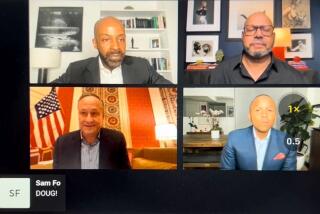Mitt Romney can’t count on home-state advantage in Michigan
Mitt Romney left his native Michigan behind 46 years ago. He has returned repeatedly during a presidential pursuit that is now in its sixth year, but rarely with the desperation evinced now.
“Michigan’s been my home, and this is personal,” Romney says in a new TV ad that features vintage black-and-white photos, including one of a teen-aged Mitt and his square-jawed father, the state’s late governor, George Romney.
The candidate was speaking of the state’s economic distress, but might as well have been addressing his presidential campaign, whose fate could rest on whether he beats back a strong challenge by his newest chief opponent, Rick Santorum, in the state’s Feb. 28 primary.
Evoking home-state memories proved effective when Romney won the Republican primary four years ago, but this year’s effort comes with a strategic twist.
Romney won in 2008 with lopsided support from the most conservative quarter of the GOP electorate, against the more moderate John McCain. This time, Romney’s support is weakest among self-described “very conservative” Republicans, who see him as too moderate — and he is trying to prove his conservative credentials anew.
The Republican right is increasingly lining up behind Santorum, a social conservative who presents the most serious threat yet to Romney’s nomination chances. Polls indicate that Michigan could go either way, making Romney’s attempt at repositioning himself a particularly acute task in this state, the first in the industrial Midwest to award delegates and a place where a loss could be shattering.
Romney is promoting what he says were his conservative achievements as governor in left-leaning Massachusetts, including resisting efforts to make same-sex marriage available to couples from out of state. This is a strategy heavy with risk, now and in a general election. In describing himself as “severely conservative” to conservative activists last week, he drew attention to his past history of moderate positions on social issues, including abortion and gay rights, and the state healthcare law that became a model for President Obama’s national plan. At the same time, his self-characterization risks alienating the middle-of-the-road voters he would need in November.
On Wednesday, Romney launched his Michigan primary campaign with a rally in Grand Rapids, the capital of the state’s conservative western side. But his lead in national opinion surveys has melted away, and new public and private polls show him trailing in Michigan.
“He’s stumbling,” said Grand Rapids consultant Greg McNeilly, a former executive director of the state Republican Party, who is unaffiliated in the presidential contest. “If he were to lose Michigan, a state that has been considered a Romney stronghold for so long, it would be a significant blow to his campaign.”
In an effort to prevent that, Romney is reverting to the formula that worked earlier this year: He’s going negative against his main opponent and leveling an intense media barrage that the other side hasn’t got the resources to counter.
Romney’s effort is being backed by a pro-Romney “super PAC” that has already dumped more than half a million dollars into a Michigan ad drive attacking Santorum as a big-spending Washington insider. In last month’s Florida primary, similarly sharp tactics helped Romney decisively defeat Newt Gingrich, his main rival at the time.
According to a source familiar with advertising purchases, Romney and his super PAC are outspending Santorum by more than 40 to 1 through next Monday. (Santorum’s backers were prepared to retaliate, minimally, with an ad showing a Romney look-alike firing mud at a cutout of Santorum.)
As he carries his candidacy into the old Rust Belt — he is also campaigning this week in neighboring Ohio, which holds a key primary on March 6 — Romney is highlighting Santorum’s votes in Congress against conservative initiatives that would have gutted labor union rights by instituting a national right-to-work law and repealed a federal statute that benefits unions in government contracting.
Santorum, who at the time was representing a state with one of the largest numbers of union workers in the country, has said he would take a different position if he became president.
Romney’s campaign is also going after Santorum for a 1998 vote to confirm Sonia Sotomayor to a federal appeals judgeship that became her stepping stone to the Supreme Court.
Santorum, with no state organization or realistic hope of matching Romney on TV, is counting on the backing of social conservatives, evangelical Christians and supporters of the tea party movement, who together could cast more than half of the primary vote.
“Michigan primary voters are susceptible to the Christian social message. That populist, blue-collar conservatism, tinged with a little protectionism, plays pretty well here,” said GOP strategist McNeilly.
Santorum will attempt to emphasize his plan to give U.S. manufacturers a tax break when he addresses the Detroit Economic Club on Thursday. That night, he’ll address a Republican dinner in Romney’s home county in the Detroit suburbs. Romney is sending his wife, Ann, who, like her husband, grew up in the area, the state’s largest primary battleground.
Romney has almost universal support from the state’s Republican establishment and is expected to receive the endorsement soon of popular GOP Gov. Rick Snyder. But establishment backing proved useless a dozen years ago for George W. Bush, who lost the state to McCain in an upset when Democrats and independents flooded the Republican primary, which is open to any registered voter.
With Romney’s candidacy at a crossroads, Republican professionals in the state expect his money advantage to be decisive. But a top Romney advisor, speaking on condition of anonymity to discuss the campaign more candidly, cautioned that the GOP race had been “like a roller-coaster ride,” and that more hidden turns may be ahead.
“There is simply no way to predict what is going to happen two weeks from now,” he said.
More to Read
Get the L.A. Times Politics newsletter
Deeply reported insights into legislation, politics and policy from Sacramento, Washington and beyond. In your inbox three times per week.
You may occasionally receive promotional content from the Los Angeles Times.






